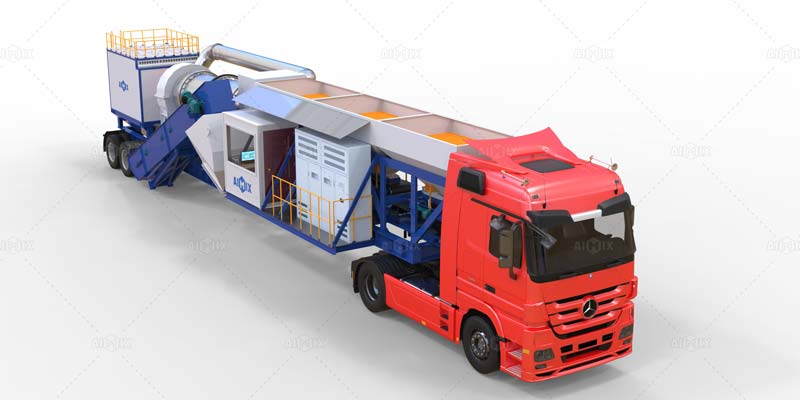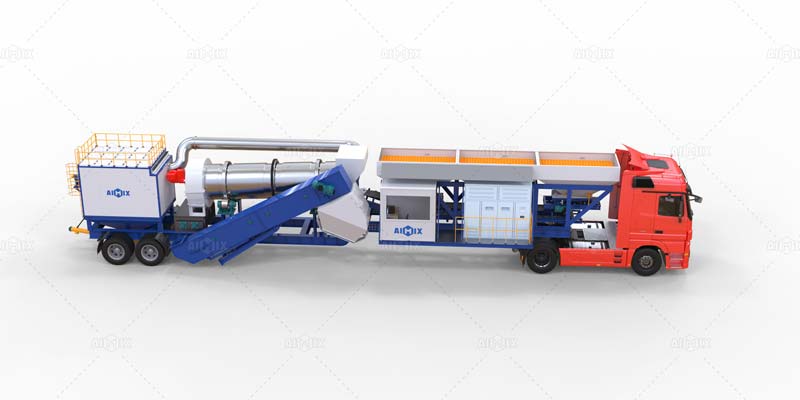Mini asphalt plants have become a popular choice in road construction and maintenance due to their compact size and mobility. They offer significant advantages, especially for small to medium-scale projects. However, these plants also present unique challenges that operators and contractors must address to ensure efficient operation and quality output. Understanding these challenges and how to overcome them is essential for maximizing the benefits of mini asphalt plants.
Operational Efficiency and Consistency
Maintaining operational efficiency and consistency is one of the primary challenges faced by users of mini asphalt plants. Due to their smaller size and capacity, the mini asphalt plant can be more susceptible to variations in performance, which can impact the quality of the asphalt mix and the overall productivity of the project.
Temperature Control
Temperature control is crucial in asphalt production to ensure the mix’s integrity and durability. Mini asphalt plants often struggle with maintaining consistent temperatures due to their compact design and limited heating capacity. Inconsistent temperature control can lead to suboptimal asphalt quality, affecting the longevity and performance of the paved surface.

Solution: Enhanced Insulation and Monitoring
To address this issue, it is vital to enhance the insulation of the heating components and employ advanced temperature monitoring systems. Improved insulation helps retain heat within the plant, ensuring that the asphalt mix remains at the desired temperature throughout the production process. Additionally, integrating real-time temperature monitoring and automated control systems allows operators to make immediate adjustments, ensuring consistent temperature management and high-quality output.
Material Flow and Homogeneity
Achieving a uniform material flow and homogeneous mix is another significant challenge with drum mixer plant. Due to their smaller mixing drums and reduced processing capacity, ensuring that all ingredients are thoroughly mixed can be difficult, leading to variability in the final product.
Solution: Optimized Mixing Technology
To overcome this challenge, investing in optimized mixing technology is essential. Modern mini asphalt plants should be equipped with advanced mixing mechanisms that promote thorough blending of aggregates, binders, and fillers. Implementing adjustable mixing blades and rotating mechanisms can enhance the homogeneity of the asphalt mix, ensuring a consistent and high-quality product. Regular maintenance and calibration of the mixing equipment also play a crucial role in maintaining optimal performance.

Logistical and Maintenance Issues
The logistical and maintenance aspects of mini asphalt plants can pose challenges that impact their overall efficiency and reliability. Efficient logistics and regular maintenance are critical to minimizing downtime and ensuring smooth operations.
Transportation and Site Setup
One of the key advantages of mini asphalt plants is their portability. However, transporting these plants to different sites and setting them up can be logistically challenging. Ensuring that the asphalt mixing plant portable is correctly positioned and stabilized is crucial to prevent operational disruptions and ensure safety.
Solution: Streamlined Transport and Setup Procedures
To mitigate transportation and setup challenges, developing streamlined procedures for moving and assembling mini asphalt plants is essential. Utilizing specialized trailers and lifting equipment can facilitate easier transport and positioning. Providing comprehensive training for personnel on setup and disassembly procedures can also ensure that the plant is quickly and correctly installed at each site, reducing downtime and enhancing operational efficiency.
Regular Maintenance and Troubleshooting
Like any piece of equipment, mini asphalt plants require regular maintenance to operate efficiently and avoid unexpected breakdowns. Due to their smaller size, maintenance tasks can be more intricate, and identifying potential issues early is crucial.
Solution: Proactive Maintenance Plans
Implementing proactive maintenance plans is vital for minimizing operational disruptions. Scheduled inspections, routine servicing, and prompt replacement of worn components can help keep the plant in optimal condition. Utilizing diagnostic tools and monitoring systems can aid in early detection of potential issues, allowing for timely intervention and reducing the risk of major failures. Additionally, having a well-stocked inventory of spare parts and ensuring that maintenance personnel are adequately trained can further enhance the plant’s reliability and longevity.
Environmental and Regulatory Compliance
Ensuring environmental and regulatory compliance is a critical challenge for operators of mini asphalt plants. Adhering to stringent environmental standards and regulations requires diligent monitoring and implementation of appropriate control measures.
Emission Control
Mini asphalt plants, like their larger counterparts, must control emissions to meet environmental regulations. Managing dust, fumes, and other pollutants is essential to minimize the environmental impact and avoid potential fines and penalties. Get more info about emission control: https://aimixglobal.com/mobile-asphalt-plant/.
Solution: Advanced Emission Control Systems
Installing advanced emission control systems is key to addressing this challenge. Utilizing dust collectors, baghouses, and scrubbers can effectively capture and reduce emissions, ensuring compliance with environmental standards. Regular monitoring of emission levels and maintaining the emission control equipment are crucial steps in sustaining regulatory compliance and protecting the environment.
Noise Reduction
Noise pollution is another concern associated with asphalt plants, particularly in urban or residential areas. Ensuring that the operation of mini asphalt plants does not disturb nearby communities is vital for maintaining good relations and adhering to local regulations.
Solution: Noise Mitigation Measures
Implementing noise mitigation measures, such as installing sound barriers and utilizing quieter machinery, can significantly reduce the noise generated by the plant. Regular maintenance of equipment to prevent excessive noise due to wear and tear is also essential. Additionally, scheduling operations during less sensitive times and engaging with the local community can help address noise-related concerns effectively.
In conclusion, while mini asphalt plants offer numerous advantages for small to medium-scale construction projects, they also present unique challenges that require careful management. By addressing issues related to operational efficiency, logistics, maintenance, and regulatory compliance, operators can optimize the performance and reliability of mini asphalt plants. Implementing proactive strategies and utilizing advanced technologies can help overcome these challenges, ensuring successful and sustainable asphalt production.